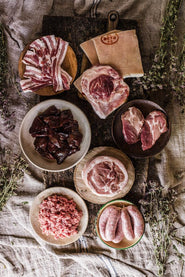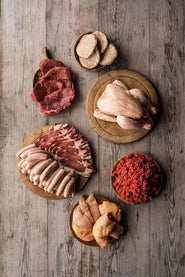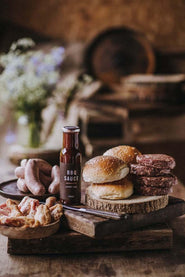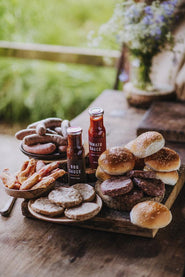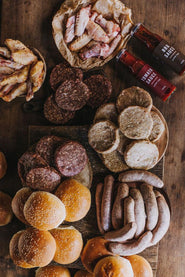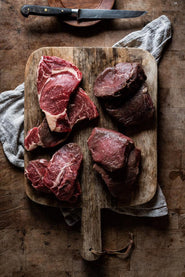One of the most common questions we get asked is ‘are you organic’? While the simple answer is no, here we delve into why we have chosen not to certify our meat using an organic certification scheme...
What is Organic?
Most consider the definition of Organic farming it to be a specific production system that aims to avoid the use of synthetic and harmful pesticides, fertilizers, and livestock feed additives.
Organic farming mostly focusses its rules and mentality around the rejection of more conventional methods of food production, drawing a stark distinction between chemical inputs and utilising natural materials. It was born out of a backlash against the devastating chemical farming that grew to such prominence in the 20th century.
Organic methods are most distinguishable when dealing with pests, when farming organically there are stringent rules around which insecticides, herbicides and fungicides the farmer is allowed to use, with a ban of all synthetic materials. Synthetic sprays are not allowed for suppressing weeds, instead sprays made from organic compounds.
There are also rules that protect the welfare of animals that can be applied to high-intensity systems of organic farming as well as smaller-scale farmers alike. Organic certification, in our opinion, provides the best and most stringent regulation of welfare in comparison to other mainstream certification bodies such as Red Tractor and RSPCA Freedom Foods.
While Organic farming has huge benefits, especially around banning and discouraging many chemical inputs and the protection of animal welfare in high volume farming systems, compared with other styles of farming that are gaining ground today, it has lost some traction in addressing some of the problems facing farmers, and indeed our environment. Since Organic Agriculture is not defined by its beneficial ecological outcome, it is instead a set of rules that are set by governments who were lobbied by agribusinesses; it is a model that can be corrupted.
There are some wonderful organic farmers who are making real change to their environment, but are they wonderful because of a label, or are they wonderful because they are right-minded and are working their farm in harmony with nature, making the right decisions for the welfare of their livestock and the health of their land? They would probably be producing food like this with or without a label. As with everything in life, there are shades of grey, and within food labelling this is also undoubtedly the case.
It is important to make it clear that we are supportive of the original pioneering organic movement and many of its totally common sense practical regulations. Many of our friends, neighbours and suppliers produce wonderful food under this banner and are rightly proud of achieving organic status. We have simply chosen a slightly different path ourselves, which I will go onto explain...

Regenerative Farming Systems
Organic farming does not necessarily guarantee the land is managed in the most sustainable way. There are many organic farms across the country who are a haven for wildlife, however I have also walked the fields of many organic meat and dairy farms that have acres of industrial ryegrass with no pasture diversity at all, fields can be compacted with terrible drainage and the sky free from native birds.
“Some organic farmers are participating in farming practices that, while still compliant with organic regulations, are not reflective of the sustainable farming practices and values on which organic agriculture was originally premised. Environmental damage, inefficient nutrient utilisation, heavy reliance on input substitution for pest and weed management, high energy use, limited cropping rotations and collapse of farmer co-operatives have been reported on organic farms spanning countries across the globe.” writes The Sustainable Food Trusts, Eva Perroni in the brilliantly informative article “Has ‘organic’ been stripped of its meaning?” an article I implore you to read if you are interested in this subject.
There is a movement - not a label I may add, that is trying to address this.
Regenerative farming began gaining traction as a result of the climate crisis that we face today. It largely focuses on farming systems that reject pesticides, artificial fertilizers and chemical inputs, and instead focus on regenerating topsoil, increasing biodiversity, improving water cycles and increasing resilience to climate fluctuation to strengthen the health and vitality of farming communities.
Unlike Organic Agriculture, regenerative farming does not focus on one singular method of farming, instead, it utilises a multitude of different techniques such as; permaculture, agroecology, agroforestry, restoration ecology, holistic management and both organic and biodynamic techniques. These principals can be combined in order to improve ecosystems and importantly sequester carbon from the atmosphere and fix nitrogen in the soil.
Key to the foundation of regenerative farming is the health of the soil, often with an aim to regenerate land that has been depleted over time, allowing nutritious food to be produced, communities to thrive and greater ecological diversity.
It is not a rule book but a living breathing mindset and way of farming that will vary depending on what each farm needs. Its critics say that because it does not adhere to strict guidelines, paperwork and audits it does not provide the consumer any guarantees. I imagine spending five minutes talking to a farmer who is passionate about regenerative agriculture will provide any customer with enough confidence to feel encouraged to buy their products without needing a label! It's this human connection, openness and team spirit within ‘Regn Ag ‘that fills us with such joy and optimism for the future of farming.
Instead of farmers following a tome of rules and regulations they are able to work with their land experimenting and learning from nature and choosing methods that are practical for their farm. It is simply not in the DNA of a regenerative farmer to use chemical sprays or practice poor animal welfare, which is why it needs no rule book or marketing label, regenerative farming is driven from a commitment to do better and improve the land. It also encourages communities to work together and for there to be a direct relationship between farmer and customer.

Food Labelling
The organic label can quickly provide customers browsing a supermarket shelf a fast way of giving some reassurance to the way their food has been produced. It will speedily tell you that the birds should have been kept in a density of no more than 6 birds per m2, that they should have had an antibiotic withdrawal time that is double the length of Red Tractor systems, but what does it really tell us about the food on the shelf? Where it has come from, who has raised it, what are they doing to contribute to society and our environment, and worryingly - is it even produced in this country without thousands of food miles and a heavy reliance on fossil fuels?
In a recent article for the Independent CIWF’s chief executive, Philip Lymbery says “Packaging on animal products can be designed to make consumers feel better about what they are buying. Pictures of animals happily grazing in rolling fields do nothing to inform people of the truth about how farm animals are actually raised. It’s all terribly confusing and I’m sure it’s all meant to be terribly confusing so the likes of you and me stay away from this stuff.”
Investigative journalist Joanna Blythman, who was once a Soil Association trustee and famously quit over the organisations change in strategy explains more around the trouble with food labeling.
"Even within the organic movement, there is resentment at how the supermarkets have muscled in on the organic message. And when pioneering organic brands like Green & Black chocolate are acquired by the likes of Cadbury."
"When it comes to wider ethical concerns, more consumers belatedly appreciate that an organic label does not guarantee that a product has been fairly traded. Obviously, if you want to help producers in the Third World, then relieving them of the health-and-safety nightmare posed by the over-use of pesticides is an important contribution; but a higher rate of pay would clearly help to put a smile on workers'faces, too. Some organic products are also fairly traded. This should be a natural pairing. Most are not, however, because pay and conditions are simply not addressed by current organic standards." you can read more in Joanna's article 'the trouble with Organics'.
We have a very different approach, we passionately believe in a relationship between the farmer and their customer which is why you won’t find our products sold anywhere else except directly from us. Which means we rely less on quick stamps of approval that are needed when browsing a supermarket shelf.
Every piece of meat we sell comes with our guarantee. We have controlled every step of the process from birth through to slaughter, onto the butcher's block and out to your door, ensuring a fair price is paid to everyone all the way through our supply chain. There is no shady middleman or corporate giant trying to take their cut. It also comes with a phone line and an email address where you can ask us anything about how your food has been raised. In fact, we love nothing more than helping our customers understand the intricacies of how their food has been produced. We have a transparent policy providing you with as much information as you want to know.
You can also follow us on channels such as Instagram and Facebook where we regularly walk the farms, so even if you cannot get to see us face to face, you can see from the comfort of your home literally the environment our animals are being raised in.
While social media's societal impacts can be dubious at times, it has one wonderful plus point, the connecting of communities. Using these platforms we are able to make you a part of our life and help you feel a closer connection to where your food has come from. You can use these platforms to ask us questions or see for yourself who we are and how we rear your food.
We simply feel we don’t need to apply multiple food labelling schemes to our produce, we want to ensure our food is brought to life through a connection with our customers. Our aim is to connect our customers with the realities of how their food has made its way to their plate. We want you to ask questions, and not feel like you are having to make a quick decision based on packaging or a label.

Slaughter
The vast majority of meat sold in the UK is processed through huge industrial abattoirs. These are a significantly weak link in the modern food chain. You will have read multiple times about how the standards can often slip in these highly geared factories. Whether meat is organic or non-organic, it is mostly killed in these same large-scale abattoirs.
Near us, for example, we have a poultry plant that kills over 1 million chickens a week, both organic and non-organic, and has been in the media recently as a hub for localised outbreaks of Covid-19 due to the poor working conditions. These industrial operations are in many ways responsible for the perception and reality that modern meat is ‘harmful’ because of food poisoning bacteria that is rampant in these factories until rendered safe by the consumer.
For us it makes no sense taking care of every step of the process only to have to ship your livestock off for long stressful journeys to an organic certified abattoir.
For the best part of a century, the number of UK slaughterhouses has been in decline. Small-scale abattoirs have become under threat due to the increased running costs and the loss of value of byproducts such as hides that would have once helped contribute to the sustainable running of the enterprise. With the rapid increase of international trade in organic products has resulted in complex regulatory systems for slaughter that inadvertently lock out small-scale artisanal abattoirs meaning that many cannot justify the additional costs of organic certification on top of increased regulatory costs. All of this has resulted in fewer and fewer low-throughout abattoirs and even less low-throughput organic certified abattoirs.
At Pipers Farm we work with a small family run abattoir based less than 10 miles away from our farm. We have worked with the team for over 25 years and trust them implicitly. As a highly skilled job and such an important part of the process, we will never compromise on working with small-scale businesses where we have total control and transparency over slaughter and a direct relationship based on complete trust and respect. The abattoir we choose to work with is not certified as organic. The nearest Organic abattoir to us would result in an hours journey for our livestock.
Frequently Asked Questions
There are a couple of sensitive areas that many of our customers ask as about, below we have laid out some key statements around the rearing of our produce. If you have any questions or would like further information please do get in touch by emailing support@pipersfarm.com or calling us on 01392 881 380.
- No routine antibiotics
- No growth promoters or additives
- Diverse pastures including herbs, legumes and grasses for all livestock
- 100% pasture fed and pasture finished (for ruminant livestock; cattle and sheep)
- Natural feed sourced from a local feed mill (for monogastric livestock; pigs, chickens and ducks)
- All animals are properly free range and encouraged to roam freely exhibiting their natural instincts
- Native breed livestock reared slowly in harmony with nature, in small groups
- High welfare standards
- A robust supply chain where we manage every step of the chain
- Fair pay for all in our supply chain
- Slaugher in small-scale farmyard based abattoirs with minimal travel
We strongly believe in the principles set out by the original pioneers of the organic movement. However right from the outset, we felt the word 'organic' may lose its meaning in a busy and competitive consumer market place. Instead, we decided we wanted to produce food with our own set of standards and be totally transparent in discussing with you our methods, bringing you closer to how your food has been produced.
Although there is no certification that covers the breadth of what Pipers Farm stands for, we are totally transparent about every detail of what we do. We welcome any questions from our customers who want to understand exactly what we do and why.
You can follow Pipers Farm on Instagram for regular updates on farm life.


